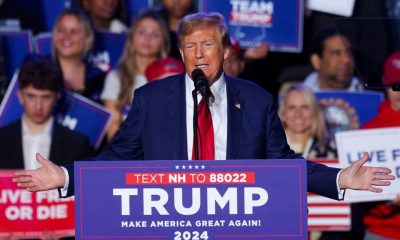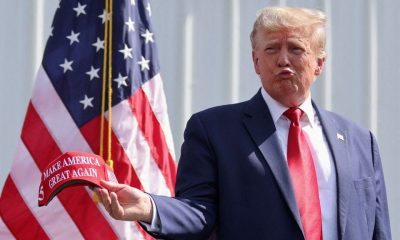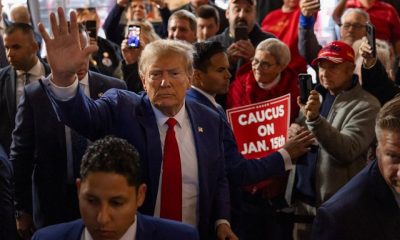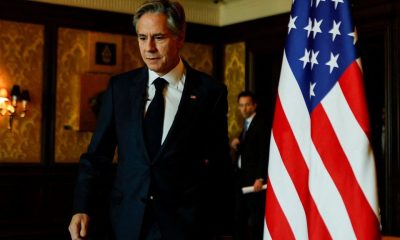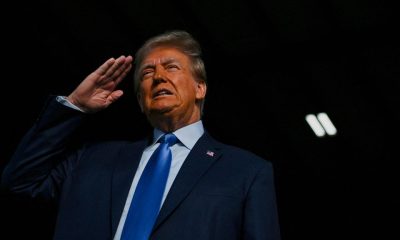AFRICA
Trump’s Surprise Visit to Iraq Raises Questions About U.S. Foreign Policy in the Middle East
On December 26th, Donald Trump made his first visit to Iraq as the President of the United States. The trip took place about a week after Trump’s decision to withdraw 5,200 U.S. troops from Syria against the judgment of his national security advisors. It also came as a result of increasing criticism that Trump has not spent enough time with the military since he began his presidency.
After an 11-hour flight, Trump reached Iraq with the first lady Melania Trump and national security advisor John Bolton. His first destination was the al-Asad airbase in the Western part of the country. During a three-hour visit there, he greeted leaders of the U.S. military. He also arranged to meet with Iraq’s prime minister Adil Abdul-Mahdi but the meeting was canceled at the last minute.
“@FLOTUS Melania and I were honored to visit our incredible troops at Al Asad Air Base in Iraq,” Trump tweeted. “GOD BLESS THE U.S.A.!”
When reporters asked Trump if he harbored any security concerns about the trip, he replied: “I had concerns about the institution of the presidency. Not for myself personally. I had concerns for the first lady, I will tell you. But if you would have seen what we had to go through in the darkened plane with all windows closed with no light anywhere. Pitch black. I’ve been on many airplanes. All types and shapes and sizes. So did I have a concern? Yes, I had a concern.”
Also posted online was a video clip just over one minute, showing Trump in a green jacket greeting soldiers and signing autographs along with the first lady. In his 20-minute speech to address all military personnel in the country, Trump claimed that he made the right decision to withdraw troops from Syria although he had no plans to do the same with U.S. military in Iraq.
“We’re no longer the suckers, folks,” he reportedly said during the speech. “We’re respected again as a nation.”
“I made it clear from the beginning that our mission in Syria was to strip Isis of its military strongholds. Eight years ago, we went there for three months and we never left. Now, we’re doing it right and we’re going to finish it off,” he continued.
Some criticized how he had corrupted the neutrality of the troops by making overly partisan remarks about his foreign policy platform. The video clip showing him sign the “Make America Great Again” hats for soldiers also invited controversy.
Charles Blanchard, former general counsel for the Army and the Air Force, was among those who found fault with Trump’s over-politicization of the visit.
“As long as the message from the president is how wonderful it is that they are doing a service for the country, that’s great,” said Blanchard. “But when it turns into a political rally, what do people see? They see enthusiastic soldiers clapping and yelling for a partisan message.”
As usual, Trump refused to be apologetic. On Thursday, he again resorted to his “fake news” rhetoric and argued that liberal media were intentionally picking fights with him.
“CNN & others within the Fake News Universe were going wild about my signing MAGA hats for our military in Iraq and Germany,” he tweeted. “If these brave young people ask me to sign their hat, I will sign. Can you imagine my saying NO? We brought or gave NO hats as the Fake News first reported!”
Featured image via Saul Loeb/AFP
AFRICA
The UK paid Rwanda an additional $126 million for the contested migrant plan.
As the tab for Britain’s controversial proposal to relocate asylum seekers to the East African nation continues to increase, the United Kingdom paid Rwanda an extra 100 million pounds ($126 million) in April. This was in addition to the 140 million pounds it had already provided Rwanda.
Even though the Rwanda project is at the core of the policy that British Prime Minister Rishi Sunak is employing to discourage illegal immigration, there have been no individuals sent to Rwanda as of yet due to legal challenges that have taken place since the initiative was introduced in 2022.
After Sunak’s immigration minister resigned this week, the polarizing policy is now regarded as a danger to Sunak’s leadership, which is anticipated to be challenged in the election that will take place the following year.
According to a letter that the British Ministry of the Interior issued on Thursday, the United Kingdom plans to give Rwanda fifty million pounds in addition to the 240 million pounds it has already provided to the East African nation.
The opposition Labour Party criticized the disclosures regarding the rising cost of a scheme that legal experts warned could collapse. Some parliamentarians within Sunak’s party are also expected to express their disapproval of the idea.
A statement by Yvette Cooper, the shadow interior minister for the Labour Party, on social networking site X, said, “Britain cannot afford more of this costly Tory chaos and farce.”
On Friday, however, the newly appointed minister for legal migration, Tom Pursglove, explained what he called the “investment” of 240 million pounds. He stated that once the Rwanda policy was operational, it would reduce the money spent on hosting asylum-seekers in the United Kingdom.
“When you consider that we are unacceptably spending 8 million pounds a day in the asylum system at the moment, it is a key part of our strategy to bring those costs down,” Pursglove explained to Sky News.
Pursglove stated that the money donated to Rwanda would assist in the country’s economic growth and help get the asylum relationship with the United Kingdom up and running.
There was no connection between the money sent to Rwanda and the treaty that the two nations signed on Tuesday, according to the letter from the Ministry of the Interior.
The treaty aims to respond to a ruling by the Supreme Court of the United Kingdom, which stated that the deportation plan would contravene local laws based on international human rights standards.
“The Government of Rwanda did not ask for any payment in order for a Treaty to be signed, nor was any offered,” according to the correspondence.
After Robert Jenrick resigned from his position as immigration minister on Wednesday, Sunak made a plea to fellow Conservative parliamentarians on Thursday to come together in support of his Rwanda proposal. He stated that the emergency legislation the government had drafted to get the scheme up and running did not go far enough.
Africa
UK interior minister travels to Rwanda to resurrect asylum plan.
On Tuesday, the Minister of the Interior of the United Kingdom, James Cleverly, came to Rwanda to sign a new treaty. This was done to circumvent a court judgment that blocked the government’s contentious policy of transferring asylum seekers to the East African nation.
The Rwandan plan is at the core of the government’s attempt to reduce migration, and it is being closely monitored by other nations who are considered to be considering policies that are comparable to Rwanda’s.
In a decision handed down a month ago, the Supreme Court of the United Kingdom stated that such a move would violate international human rights norms embedded in domestic legislation.
Following the decision, the United Kingdom has been making efforts to revise its agreement with Rwanda to incorporate a legally binding treaty that guarantees Rwanda would not remove asylum seekers brought there by the United Kingdom. This is one of the primary concerns of the court.
Several attorneys and charitable organizations have said that it is highly improbable that deportation flights will begin before the election. With a lead of more than ten percentage points in the polls, the opposition Labour Party intends to abandon the Rwanda policy if it is victorious.
A meeting between Cleverly, who arrived in Kigali, the capital of Rwanda, on Tuesday morning, and Vincent Biruta, the country’s Minister of Foreign Affairs, is scheduled to take place to sign the agreement.
“Rwanda cares deeply about the rights of refugees, and I look forward to meeting with counterparts to sign this agreement and further discuss how we work together to tackle the global challenge of illegal migration,” Cleverly says.
The United Kingdom aims to transfer thousands of asylum seekers who came to its beaches without authorization to Rwanda under the plan that was agreed upon the previous year. This discourages migrants from crossing the Channel from Europe in tiny boats.
In exchange, Rwanda has been given an initial payment of 140 million pounds, equivalent to 180 million dollars, along with the promise of additional funds to cover the costs of housing and medical treatment for any deported persons.
THE PRESSURE
A great deal of pressure is being put on Prime Minister Rishi Sunak to reduce net migration, which reached a record high of 745 thousand people in the previous year, with the vast majority of migrants entering through legal channels.
“Stop the boats” is one of the five goals that Sunak has set for his government. The influx of asylum seekers who pay people smugglers for their crossings of the Channel, which frequently take place in boats that are overloaded and not seaworthy, is one of the aims that Sunak has set.
The Supreme Court determined that the Rwanda plan should not be implemented because there was a possibility that refugees who were deported would have their claims incorrectly evaluated or that they would be sent back to their country of origin to suffer persecution.
In the latter part of this week, it is anticipated that the new treaty will be followed by the release of legislation declaring Rwanda a so-called safe nation. This law is intended to prevent legal challenges against the planned deportation flights.
Despite this, this will probably result in a fresh set of political and legal difficulties.
An immigration attorney at Harbottle & Lewis named Sarah Gogan stated that the government’s policy will be challenged due to Rwanda’s history of violations of human rights provisions.
“Rwanda is an unsafe country and this is not a quick fix,” added the politician. “You cannot in a matter of weeks or months reform a country and turn it into one with an impartial judiciary and administrative culture.”
Another “gimmick” was what Yvette Cooper, the spokesperson for the Labour Party’s home affairs department, called the most recent measures proposed by the administration.
Whether or not to design the law in a way that would avoid subsequent legal challenges is still up for debate by the administration.
Several members of the Conservative Party in parliament are putting pressure on the government to incorporate a “notwithstanding” clause into Rwanda’s policy. This clause would disapprove the domestic and international human rights commitments of the United Kingdom regarding Rwanda.
However, some politicians within the ruling party, such as Robert Buckland, have stated that such a move would be “foolish” and undermine the Good Friday Agreement, which is primarily responsible for ending three decades of carnage in Northern Ireland. This is because the European Convention on Human Rights supports the treaty.
Africa
Madagascar leader wins presidential vote, constitutional court says
On Friday, the High Constitutional Court of Madagascar certified Andry Rajoelina, the current President of Madagascar, to be the victor of the election a month ago, essentially granting him a third term in office.
Following the dismissal of several challenges submitted against the preliminary results by the electoral board, the court said that Rajoelina collected 58.96% of the votes that were cast.
Florent Rakotoarisoa, the chairman of the High constitutional court, stated that “Andry Rajoelina is elected as the president of the republic of Madagascar and is taking his functions as soon as the swearing (is conducted) comes to an end.”
The rejected challenge was submitted by the politician Siteny Randrianasoloniaiko, who received 14.39% of the vote, according to the court. This was one of the challenges that was denied.
Ten of the thirteen candidates chose not to participate in the election; nevertheless, their names were already on the ballot, so they could still divide the remaining votes. The court reported that the turnout was 46.35 percent.
The election on November 16 was preceded by weeks of demonstrations, during which the opposition accused Rajoelina of having fostered conditions that were unjust to the election.
The charges that the vote was rigged have been refuted by Rajoelina, and the army has issued a warning against any attempts to destabilize the country.
As far as the opposition is concerned, the voter turnout for the election was the lowest it has ever been in the country’s history.
Hajo Andrianainarivelo, a former minister who was one of the candidates who chose to abstain from voting, has committed to fight against what he has described as a lack of respect for the rules of the state and the tyranny of the people.
“The popular fight begins now,” he declared on Thursday referring to the ongoing conflict.
Rajoelina, now 49 years old, initially won power in a coup in 2009. After resigning from his position as the head of a transitional authority in 2014, he went on to win another election in 2018 and regain his position as president.
-

 Europe7 months ago
Europe7 months agoRussia’s Shoigu accuses the West of seeking to expand the Ukraine war to the Asia-Pacific.
-

 Geopolitics & Foreign Policy6 months ago
Geopolitics & Foreign Policy6 months agoTurkey’s Erdogan says he may visit Egypt soon, discuss Gaza patients -media.
-

 America8 months ago
America8 months agoRepublican US House to hold first Biden impeachment inquiry hearing
-

 Geopolitics & Foreign Policy6 months ago
Geopolitics & Foreign Policy6 months agoRussia deploys new nuclear missile in Kaluga region – RIA
-

 Geopolitics & Foreign Policy6 months ago
Geopolitics & Foreign Policy6 months agoCeasefire takes hold in Gaza ahead of hostage release; aid enters enclave.
-

 Gender, Sexuality & Identity7 months ago
Gender, Sexuality & Identity7 months agoGreenland women ask Denmark for compensation over involuntary birth control.
-

 Global Issues & Cooperation8 months ago
Global Issues & Cooperation8 months agoHuman rights in Russia have ‘significantly deteriorated’ – UN expert.
-

 TECH6 months ago
TECH6 months agoAustralia to amend laws to regulate digital payments like Apple and Google Pay.


